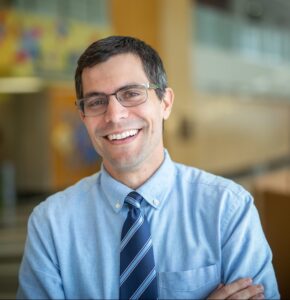Neal dejong, MD, MPH, at the UNC School of Medicine, David Y. Ming, MD, at Duke University School of Medicine and Ryan Coller, MD, at University of Wisconsin School of Medicine and Public Health, received $5.5 million to study hospital-to-home transitions across settings for children and youth with special healthcare needs.

Nearly one in five children, almost 14 million in the United States, have a special healthcare need that may require hospitalization. After a child’s hospital stay, the transition back home can be risky, particularly for children with chronic health issues and complex medical conditions. To understand how to best support children and youth with special healthcare needs (CYSHCN), researchers of the CYSHCN National Research Network (CYSHCNet) received $5.5 million for a multi-site study funded by the Patient-Centered Outcomes Research Institute (PCORI) to compare two types of hospital-to-home transitional care to optimize outcomes.
The CYSHCNet researchers are led by David Y. Ming, MD, principal investigator, associate professor of pediatrics at Duke University School of Medicine; Neal dejong, MD, MPH, associate professor of pediatrics and member of the UNC Children’s Research Institute at the UNC School of Medicine; and Ryan Coller, MD, associate professor of pediatrics at the University of Wisconsin School of Medicine and Public Health.
Over a one-month post-discharge period, researchers will compare the effectiveness of two transitional care approaches — focused dose versus extended dose — reducing return visits to the hospital or emergency department and increasing parent-reported confidence. They will also evaluate the impact of each type of hospital-to-home transitional care on specific CYSHCN patient groups, including those with highly complex clinical needs and those from racial/ethnic minority groups or living in rural areas. Lastly, researchers will investigate how and why each approach to hospital-to-home transitional care is effective and for whom they work best.
The study team includes multiple community partners, including parents and caregivers with lived experience, clinicians, policymakers, and health system leaders. A community advisory board, primarily composed of a diverse group of parents/caregivers of CYSHCN, will work closely with the research team throughout the study. This collaborative effort aims to contribute to the equitable improvement of overall care for all CYSHCN transitioning from hospital to home.
About CYSHCNet:
CYSHCNet brings academic researchers and lived experience partners together to study the health care system issues that matter most to CYSHCN and their families. We help CYSHCN and their families by advancing knowledge and implementation of optimal health systems through innovative, rigorous multi-site studies, far reaching dissemination of findings, meaningful partnerships with families, and strong training of emerging CYSHCN investigators. Learn more: https://cyshcnet.org/.